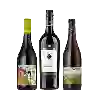
Winery Montariol DegrooteHenri de Monteclain Hérault
This wine generally goes well with beef, veal or pasta.
Food and wine pairings with Henri de Monteclain Hérault
Pairings that work perfectly with Henri de Monteclain Hérault
Original food and wine pairings with Henri de Monteclain Hérault
The Henri de Monteclain Hérault of Winery Montariol Degroote matches generally quite well with dishes of beef, pasta or veal such as recipes of venison leg in casserole, pipe rigate bolognese sauce or chicken breast with curry and mushrooms.
Details and technical informations about Winery Montariol Degroote's Henri de Monteclain Hérault.
Discover the grape variety: Baco noir
It is the only vinifera-riparia that has been commercialized. It is the result of crossing the folle blanche with the riparia grand glabre created in 1902 by François Baco. Depending on the region, we can still find some small plots of black Baco vines often mixed with other varieties. You will also find trellises or arbors installed a long time ago in front of old houses and still maintained in a more than remarkable way thanks to the great vigour of this variety. It should be noted that there is also a white baco resulting from the crossing of the folle blanche by the noah and resembling much the latter.
Informations about the Winery Montariol Degroote
The Winery Montariol Degroote is one of of the world's great estates. It offers 38 wines for sale in the of Hérault to come and discover on site or to buy online.
The wine region of Hérault
The wine region of Hérault is located in the region of Pays d'Oc of Vin de Pays of France. Wineries and vineyards like the Domaine La Grange des Pères or the Domaine La Grange des Pères produce mainly wines red, white and pink. The most planted grape varieties in the region of Hérault are Merlot, Cabernet-Sauvignon and Chardonnay, they are then used in wines in blends or as a single variety. On the nose of Hérault often reveals types of flavors of minerality, yellow apple or passion fruit and sometimes also flavors of nutty, anise or stone fruit.
The wine region of Pays d'Oc
Pays d'Oc is the PGI for red, white and rosé wines that are produced over a wide area of the southern coast of France. The PGI catchment area corresponds roughly to the Languedoc-roussillon">Languedoc-Roussillon wine region, one of the largest wine regions in France. The area covers all wines that are not produced under the strict laws that govern AOC-level appellations in the regions: among them, Corbières, Minervois and the Languedoc appellation itself. The Pays d'Oc PGI is arguably the most important in France, producing the majority of the country's PGI wines.
The word of the wine: Power
Character of a wine that is full-bodied, generous and has a rich bouquet.













